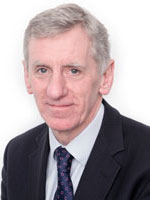 |
| NICE CEO Sir Andrew Dillon |
The U.K.'s cost-effectiveness watchdogs are cracking down on expensive cancer treatments yet again. This time the ax is falling on Celgene ($CELG), which learned today that the National Institute for Health and Care Excellence (NICE) won't back the company's drug Abraxane to treat metastatic pancreatic cancer.
The agency reviewed a combo treatment containing Abraxane (nab-paclitaxel) and Eli Lilly's ($LLY) Gemzar (gemcitabine), which was approved in Europe to treat aggressive pancreatic cancer in January. NICE looked at trial data provided by Celgene and concluded the drug combo is too expensive to justify coverage by the National Health Service (NHS).
"Although a number of newer treatments including nab-paclitaxel have been introduced, we are disappointed that, when considering the impact of side effects as well as how effective the treatment is the evidence fails to show that it works any better for patients than other treatments already provided by the NHS," said NICE CEO Sir Andrew Dillon in a statement.
According to NICE, Celgene's data showed that the current standard of care for metastatic pancreatic cancer--a cocktail of four chemo drugs--was actually more effective than the Abraxane combo. Furthermore, the cost per "quality adjusted life year" (QALY) gained for the combo compared to Gemzar alone is £78,500 ($126,617), NICE estimates, which far exceeds the £30,000 ($48,368) it usually deems acceptable. Gemzar is often prescribed by itself or in combination with an older drug to pancreatic cancer patients who can't tolerate the four-drug chemo regimen.
NICE is now accepting comments on the draft guidance and expects to issue a final ruling in January.
There's little doubt Celgene will be weighing in on this decision. After NICE ruled against the company's blood cancer drug Revlimid for treating bone marrow disorders known as myelodysplastic syndromes, Celgene not only handed over new data. It also promised to cap the cost burden on the NHS by giving the drug away whenever patients need more than 26 monthly doses. In late August, NICE changed its mind and recommended Revlimid for treating those disorders.
The pharma industry is learning the hard way that the only way to get on NICE's good side is to lower the prices of expensive drugs. In August, NICE issued a draft guidance reversing a positive decision it made four years ago on AstraZeneca's ($AZN) Iressa for non-small cell lung cancer. AZ had capped the price of the drug in the U.K., but apparently that's no longer enough.
Last week, NICE did issue one positive opinion, on Alexion's ($ALXN) Soliris for treating a rare blood disorder--but it did so with one big caveat. The product, which at £340,200 ($569,000) a year is considered the world's most expensive drug, will be monitored by an "expert center." Among that center's responsibilities will be trying to determine whether Soliris dosages can be reduced or even stopped altogether at some point. It's yet another strategy the U.K. has come up with to save money on pricey prescription drugs.
- here's NICE's release
- access the draft guidance here
- read more at PMLive
Special Reports: Top 10 best-selling cancer drugs of 2013 - Revlimid